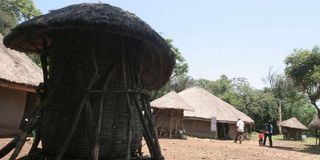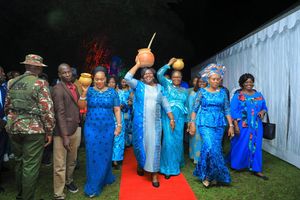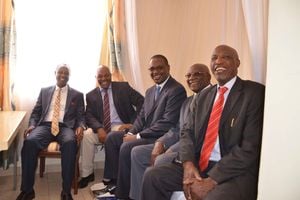
A traditional Luo homestead at the National Museums of Kenya in Kisumu.
Last December, as we sat at home in Ka Gwengi village, Yimbo West Ward in Bondo, Siaya County, enjoying the cool breeze from Lake Victoria and exchanging good-natured banter with my cousins, we were informed of a family meeting.
The meeting, called by our only surviving uncle, Peter Gwengi, whom we affectionately call 'Papa', was scheduled for December 28.
None of us had any idea of the agenda for the meeting, which we called a 'men's conference'. Our sisters, mothers, aunts and wives were technically excluded.
As expected, the topics focused largely on single men in the family, financial challenges, our personal development and that of our families.
And then there was the elephant in the room, a thorny issue that seemed to affect most of us -- a house in the village, culturally known as a simba in Luo and Luhya communities.
In Luo culture and tradition, a man is obliged to build a simba in his father's homestead, even if he continues to live and work in town.
A first-born son's Simba is usually built on the right side of his father's house (or the right side of the first wife's house in a polygamous home), while the second-born son builds his house on the left side.
In the past, and even today, in some homesteads in rural western Kenya, a simba is often a mud hut with a grass-thatched roof, but this is slowly changing as people begin to embrace modern and permanent structures.
This simple structure is unlikely to have amenities such as running water, sewerage or electricity as it is rarely used.
In most cases, the huts are used by their owners as holiday homes, probably for less than 10 days a year.
The Simba was to be a temporary home until he built his own house, known locally as "goyo dala" (building a home), on a piece of land given to him by his father.
For Mr Gwengi, this was food for thought for all of us who have yet to build a house in the village. The message seemed to resonate with most of us, although the financial challenges remained a serious obstacle.
By the end of our 'men's conference', we felt a little embarrassed but challenged by what Mr Gwengi described as "good pressure" to develop ourselves.
According to papa, a house is a strong sign of belonging for a man and his family. It also earns a man respect from his peers and society at large.
“Without a house at home, your people feel like you can abandon them anytime,” says Mr Gwengi.
“It goes further than just personal gratification, but also satisfaction to your spouse and children who you travel with to visit grandparents at home. A house also gives your wife some level of autonomy and the ability to organise her life. The house makes her feel complete and comfortable in her marriage.”
Papa's concern and wise counsel has brought the plight of the 'houseless' young men to the fore, including ridicule and constant lectures from relatives.
The embarrassment has led some men to devise tactics to get through the festivities, including staying in guesthouses, hotels and, more recently, Airbnbs.
Victor Otieno runs a couple of Airbnbs in Homa Bay town and says he has on several occasions hosted clients who are from the area but choose to stay at his facilities for the night as they spend time with their relatives at home during the day.
“Last year, I hosted a family that booked my two-bedroomed house for Sh3,500 a day for the entire five days they were in the rural for holidays. They told me that their ancestral home was just five kilometres away but since they didn’t have a house there they had to seek alternative accommodation elsewhere,” says Otieno.
But while the short-term rentals provide a home-like experience, they delink the men from the community.
In a place called Kolenyo in Seme sub-county, 36 kilometres from Kisumu town centre in Kano Kolwa, about 10 or 15 minutes’ drive from the CBD, men without Simba often spend the nights during the festivities in clubs until morning in what the revellers call Aluta (non-stop clubbing 24/48 hours).
Some have even gone so far as to take tents with them for their overnight stay in the countryside.
In situations where even older brothers or cousins do not have houses, men would even sit around bonfires all night, ostensibly to enjoy the fire while passing the time.
“While my wife and children spend the night in my father’s house. I would sleep inside the car, or join my cousins and tell stories till late in the night and proceed to a nearby centre for accommodation. But I must ensure I that get back home early before my relatives are awake to avoid ridicule,” says Rogers Ouma, a driver for a top corporate in Kenya.
But for Ouma, the cultural barriers of hierarchy are to blame for his inability to build a Simba at home.
He is the second born in a family of seven and the second son.
However, Ouma cannot build a Simba before his older brother does.
“My elder brother relocated to Mombasa and only visited home 10 years ago. He is yet to marry and has not constructed his Simba. This has stalled all of my plans because where I come from in Alego, culture is taken very seriously,” said Ouma.
Before he built his house, journalist Isaiah Omondi used to sleep at a cousin's house when the owner was away. But when the cousin was around, he was forced to look for accommodation elsewhere.
"Having a house at home, no matter how small it is, gives one some confidence and a sense of privacy. It is so uncomfortable sleeping in someone else’s house, especially when you have a wife and children,” says Omondi.
It is this shame that has led some of the 'culprits' to avoid visiting their ancestral homes during the Christmas season and instead take their families to the coast or neighbouring countries for the holidays.
For some people, owning a house in the countryside is never a priority, they would rather set aside funds for other ventures such as buying a car, since according to them, a vehicle has become a necessity in the urban areas where they spend most of their time.
Some young men who spoke to Nation.Africa see building a Simba at home as a difficult venture that requires a lot of money, a notion dismissed by Omondi, who built his house in 2012 when he was receiving a monthly stipend of Sh7,000 as a writer for a weekly publication.
“I decided to buy at least two iron-sheets every month. Even though I wanted 32 iron-sheets, I eventually settled 20 with plans to expand in the future,” he explained.
The chairman of the Luo Council of Elders, Ker Odungi Randa, says young men should be discouraged from practising what is known in the Dholuo language as 'Lao Nindo' (sleeping in other people's houses).
He is referring to some adult men who have become accustomed to the ridicule and brazenly and unrepentantly sleep in their parents' houses where they once had rooms as minors.
“Building your house as a Luo man is very important. We cannot have Luo men engaging in Lao Nindo every year. In fact, we can only allow young men to sleep in their grandmother’s house, because in our culture a grandmother considers her grandson as a ‘husband’. But this should only be tolerated during early stages of life before they become adults,” says Mr Randa.
He explains that a Simba should not be a complicated modern house, but a simple structure that can accommodate the man and his young family.
Ironically, those who have built mansions or large houses at home have also come under sharp criticism, accused of providing 'dead capital'.
George Abwajo, an economist and investment expert, acknowledges that culturally, building a 'simba' at home is a sign of maturity for a man and that he is ready to start his own lineage.
He believes the pressure on the majority of young men to build these houses, while juggling careers, townhouses and new families, is becoming more apparent every year. This has been exacerbated by the increasing pressure on households as purchasing power and disposable income decline.
Abwajo believes that people have short-, medium- and long-term goals, and should silo these needs, while limiting non-priority areas.
He believes that while rural housing is important, it needs to be assessed in terms of need and category.
The most important thing is to have an initial plan, and if it allows, small savings can be made throughout the year, even for two or three years, according to the plan, to realise it.
He adds that basic needs should not be sacrificed to realise it.
“While it may look unachievable with recent pressures, exploring other income earners to achieve your societal desires is one area that we can explore in a dynamic world where income keeps getting constrained,” says Abwajo.
Mike Armstrong, a social worker and a life coach, said people should learn about their culture before making such investments.
“There is a reason why these wise men came with that tradition that has been carried on for years. Understanding that will guide young men in making the right decision,” says Armstrong.
He believes that men should be leaders in the community and that this means honouring what existed and worked before their existence and protecting the benefits and achievements so that they are not lost.
According to the life coach, you cannot get rid of culture without replacing it with something else, which is a recipe for anarchy.
He advises men to look directly at their current challenges and commit to solving them, whatever the circumstances and pressures.
“We are aware of the pressure, but strive to do it within your timelines whether it takes one, two or five years. Do not bow to pressure from outside forces. But by the time your son comes you would have broken the barriers for him so that he builds on what you have achieved.”
On the subject of dead capital, he believes that one should fulfil the cultural practices required of him at a tender age, because there will come a time when one needs to consult more and a person may find that building that big mansion at home may not be of any value.










